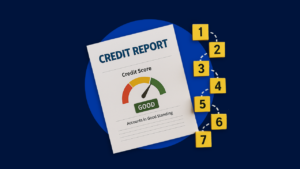How to rebuild credit after bankruptcy




Key takeaways
- Bankruptcy will impact your credit for a period of time, limiting your ability to borrow new loans.
- If you’ve been through a bankruptcy, there are proactive measures you can take toward rebuilding your finances, such as establishing a secured credit card or applying for a credit-builder loan.
- The fresh start offered by bankruptcy makes it a good time to build an emergency fund, stick to a budget and break bad habits.
Bankruptcy is a legal process that helps people with unmanageable debts get their finances back on track. Hundreds of thousands of bankruptcies are filed every year, according to the Administrative Office of the U.S. Courts.
While bankruptcy can provide immediate relief from debt, it can also cause a significant hit to your credit score. Fortunately, you can rebuild your credit and improve your finances with time and effort.
How bankruptcy affects your credit
Bankruptcy negatively affects your credit. Payment history is one of the most important factors affecting your credit score, and filing for bankruptcy shows that you did not repay your creditors as originally agreed.
Even if the bankruptcy was due to circumstances outside your control, it signals to lenders that you are a high-risk borrower. You may have trouble getting approved for the lines of credit that you want or need in the future. Any credit you obtain will likely come with higher interest rates.
Typically, a bankruptcy filing drops a person’s credit score by up to 200 points. However, the exact hit will vary depending on your overall credit file. Often, bankruptcy candidates already have poor credit due to missed payments. But on occasion, someone with a stronger credit profile pre-bankruptcy filing can expect to see a steeper drop in their score.
The effect of bankruptcy on your credit can be long-lasting beyond the initial credit score drop. A Chapter 7 bankruptcy stays on your report for 10 years, while a Chapter 13 bankruptcy remains for seven years. Your approach for repairing your credit may depend on the type of bankruptcy for which you file.
7 steps to rebuild your credit after bankruptcy
Bankruptcy stays on your credit report for seven to 10 years, but that doesn’t mean you need to wait that long to rebuild your credit. Here are seven steps you can take to rebuild your credit and qualify for better rates on loans and credit lines as soon as possible.
1. Keep up with payments on existing loans
Some debts, like alimony, child support and certain legal penalties can’t be discharged in bankruptcy. If you still have debts after filing for bankruptcy, prioritize making repayments. Even with a derogatory mark on your report, you can still benefit from making timely payments.
Your payment history makes up 35 percent of your FICO score, so making consistent, on-time payments is the best way to rebuild your credit. Set up reminders or use autopay to ensure you don’t miss any payments.
2. Check your credit reports and consider credit monitoring
After bankruptcy is a good time to review your credit reports for accuracy. Your report might have errors, such as the same debt listed twice or closed accounts reported as open.
You can visit AnnualCreditReport.com to get free copies of your credit reports from each major credit bureau: Equifax, Experian and TransUnion. Review your reports carefully, and if you find errors or inaccuracies, file a dispute. Keeping your report accurate can help improve your credit score over time.
Consider signing up for credit monitoring to spot any inaccuracies or errors that may arise on your reports. Credit monitoring can also help you learn about score changes and observe your progress while rebuilding your credit.
3. Apply for a credit card
Adding a new credit card and using it responsibly can boost your credit score. Making on-time payments can establish a good payment history. A new account also increases your total credit limit, which may positively impact your score.
Getting approved for a credit card after bankruptcy can be challenging. To boost your odds of approval, look into cards that are easier to get. Secured credit cards offer near-guaranteed approval because you make a cash deposit that acts as collateral. Unsecured credit cards with low requirements, like retail store cards, are another good option.
4. Apply for a credit builder loan
A credit builder loan is a product designed to help people reestablish credit after going through a significant event like bankruptcy. It lets you borrow a small amount of money and build credit as you make on-time payments.
Unlike a typical loan, you don’t get the funds up front. Instead, the lender keeps the funds in a restricted account, such as a CD, while you make payments. Once you pay off the loan, you get the funds, minus any applicable fees.
5. Become an authorized user on someone else’s account
Becoming an authorized user on someone else’s credit card is a common way to rebuild credit. As an authorized user, you can benefit from a friend or family member’s good credit history. Becoming an authorized user doesn’t usually involve a credit check, so it’s an option even with a bankruptcy on your record.
The process involves obtaining a card in your name that is linked to the primary cardholder’s account. You can make purchases, and the primary user is responsible for payments. Simply having your name on the account can help to repair your credit, so you don’t necessarily even need access to the account to make purchases.
6. Apply for a loan with a co-signer
When you’re ready, applying for an auto loan or personal loan could help you rebuild your credit. A well-qualified co-signer can improve your chances of getting approved because lenders consider the co-signer’s credit score. Having a co-signer can also help you secure better terms.
You may be able to find a co-signer by asking a trusted family member or close friend with a strong credit history. They will be responsible for the debt if you do not make payments, so ensure they understand the commitment involved with co-signing. To protect their credit — and build yours — prioritize making your payments on time, every time.
7. Hire a credit repair professional
After bankruptcy, you don’t need to navigate your credit repair journey alone. Credit repair professionals, including credit repair specialists, credit counselors, specialized attorneys or financial advisors, can offer personalized strategies to improve your creditworthiness.
Credit repair companies and professionals can offer a wide variety of services to help you build credit, including:
- Checking your credit report for inaccuracies
- Disputing errors on your behalf
- Offering budgeting advice
- Providing guidance on rebuilding your credit
- Recommending credit-building products
How to improve your finances after bankruptcy
Bankruptcy offers an opportunity to reset your finances and work toward goals that felt impossible when you were struggling with debt. Take this time to build an emergency fund, stick to a budget and adopt good credit habits.
Build an emergency fund
With much of your debt eliminated, it’s an ideal time to start saving. An emergency fund is critical for providing financial security. It can help you better handle unexpected events, such as a job loss or health problems, without taking on new debt.
As a general rule, aim to save three to six months’ worth of living expenses. If that feels daunting, you can start by setting aside a more manageable amount, like $500 or $1,000. Then, continue gradually increasing your savings.
You can use unexpected windfalls, like bonuses at work, to boost your emergency fund. You may also explore ways of increasing your monthly income, such as starting a side hustle or establishing a passive income stream to save more.
Keep your emergency fund separate and easily accessible in a high-yield savings account. Avoid the temptation to dip into your emergency fund for occasional expenses, like holiday gifts, that you can plan and budget for.
Stick to a budget
After bankruptcy, the money that would have gone to debt payments can be redirected to other needs. To make the most of this opportunity, create a new budget to plan your monthly spending.
To create a monthly budget, calculate your income and track your spending for a month or two to understand your financial habits. Then, prioritize your expenses based on your financial goals and determine how much money you can put toward on needs, wants and savings.
If you have trouble sticking to budgets, consider using tools like budgeting apps or templates to help you stay on track. Some people prefer to set aside cash for each budget category to prevent overspending. It’s also helpful to regularly review and adjust your budget to ensure it still meets your needs.
Build good credit habits
While bankruptcy is often caused by pressures outside your control, like medical issues or job loss, poor financial habits can also play a role. Adopting good habits can help you get your finances back on track. When you use your credit card:
- Aim to pay off your balance monthly: Keeping a balance on your credit card doesn’t help you build credit. Get in the habit of paying off the entire statement balance each month.
- Make more than the minimum payment: If you can’t pay off the entire balance, pay as much as you can. Making only the minimum payment means you pay more interest and your debt continues to grow.
- Read your credit card statements: It’s easy to let unopened bills pile up when you’re overwhelmed by debt. After bankruptcy, get back in the habit of reviewing your statements to stay on top of your purchases and balances.
- Spend within your budget: Before using your credit card, double-check that the purchase fits into your regular household budget.
Next steps
Bankruptcy can negatively affect your credit, but with time and effort, you can rebuild a good credit history. Repairing your finances will require diligence, so be sure to keep your expectations realistic. Your financial slate may be wiped clean, but building back a positive history will take time.
Open new credit accounts, such as a secured credit card, strategically, and prioritize making payments on time every month. It’s also important to focus on adopting good financial habits for the future.
If you need help rebuilding your credit after bankruptcy, consider contacting a credit repair agency.
Frequently asked questions
Why we ask for feedback Your feedback helps us improve our content and services. It takes less than a minute to complete.
Your responses are anonymous and will only be used for improving our website.




